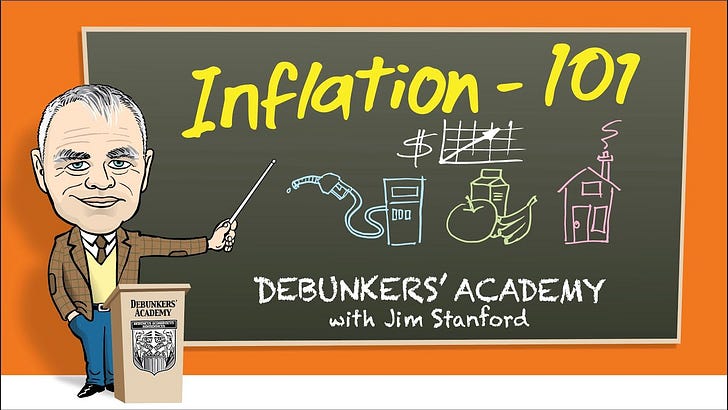In yesterday’s post, I linked to some things I find useful and important as we continue to debate the state of our economy and the best way(s) to think about inflation and what to do about it.
Early last week, I wrote about the many things we could be doing to try to bring down inflation. I’m working on a post about inflation and monetary policy—and why rate hikes are the wrong medicine for what ails us—but I won’t have it finished for another day or two.
So I thought I’d share a couple of things you might enjoy in the meantime. The first is a short video by Jim Stanford, who is a Canadian labor economist. There’s quite a lot of overlap in our thinking.
The other is a transcript of the televised address that President Carter delivered to the nation on October 24, 1978. This was Carter’s effort to have a “frank talk” with the American people about inflation and what we—all of us working together—could do to rein it in. When he delivered his remarks, headline CPI inflation was running 8.9 percent.
It’s an interesting read.
The following year, Carter appointed Paul Volcker and, well, the rest is history.




Carter decried as "simplistic and familiar" the notion that a solution to inflation might be "a deliberate recession which would throw millions of people out of work." That's precisely what his Federal Reserve chair Paul Volcker delivered.
What is truly dismaying about Carter's remarks is that Biden could swap out some numbers and dates and deliver the same speech forty-four years later. That's how little mainstream (Democratic) thinking about inflation has progressed in that time.
Neo-classical macro no longer "works", actually never did. Learned that from about 10 years of listening to every video/podcast of Steve Keen, Michael Hudson, Stephanie, Warren, Randy, etc. Every present leading reform movement focuses on how the money system de-stabilizes the economy, but they're too caught up in the theoretical and abstract complexities of the system when they should instead be hunting for the operant factor/concept in the current system that keeps all of its problems in suspension. That's what a paradigm concept is, a description of the essence and operant factor of a system, body of knowledge or area of human endeavor. Paradoxically the key to perceiving and understanding paradigms is simplicity not complexity. That's because paradigms are the quimtessential integrative of opposites phenomenon. It's a single new concept...that learned how to apply changes an entire complexity.
Stephanie, are you aware of the mass movement between the two world wars started by a guy named C. H. Douglas. It was called Social Credit. Douglas first came up with the idea of a universal dividend, what is referred to now as UBI, and he also suggested we have what he called a compensated retail discount. This second policy (UBI and a job guarantee are also good ideas and a part of my new paradigm policy program) was a potential game changer. The problem was Douglas still lived in the equilibrium mindset of economics and he pre-dated Kuhn's elucidation of the paradigm. I've taken the compensated retail discount and simply made it a high percentage point at retail sail. Such a policy has macro-economic effect because it is at the terminal ending point of the entire (legitimate) economic/productive process where production exits the economy and becomes consumption. It is also hence the terminal summing point for all costs including profit for every item or service and also the terminal expression point for inflation. Hence a 50% discount to the consumer at retail can forever slay inflation (garden variety inflation is generally a smallish single digit percentage, bad inflation like now as Stanford accurately describes is generally less than 10% yoy and hyperinflations never occur unless several disastrous circumstances take place first including finally with the banks leveraging up currency speculators who short the currency and that is when the true hyperness kicks in. All of the disastrous circumstances can be avoided most especially the final stage by a sovereign currency nation declaring that any attempt to anti-socially profit from de-stabilizing its money system be "null and void".).
As stated here before a 50% discount to the consumer 1) immediately, empirically and continuously doubles everyone's purchasing power by implementing beneficial price and asset DEFLATION into profit making economic systems (holy orthodoxy busting reality that is), 2) with the rebate of the discount back to the merchant it makes them whole on their overheads and profit margins and doubles the potential demand for every enterprise's goods and services, the very description of good economic times and 3) ends any rational objection to fiscal deficits to upgrade infrastructure, re-industrialize the US and fund the mega-projects necessary to fight climate change. Let's stop palliating the problem (the current monopolistic monetary paradigm) and change it...before its too late.